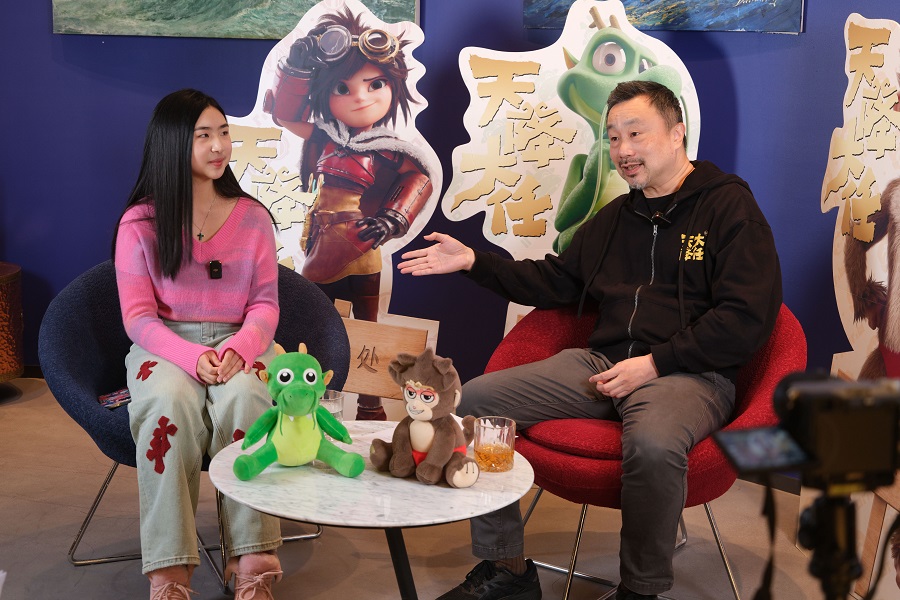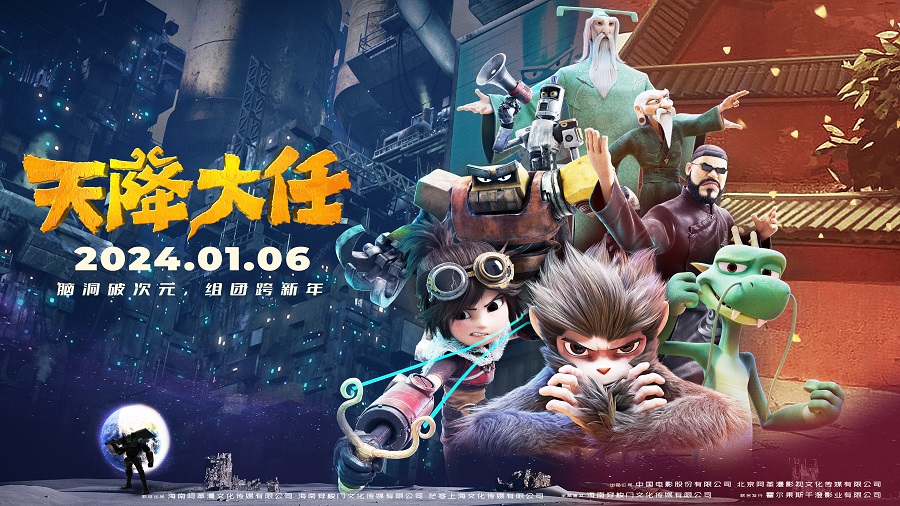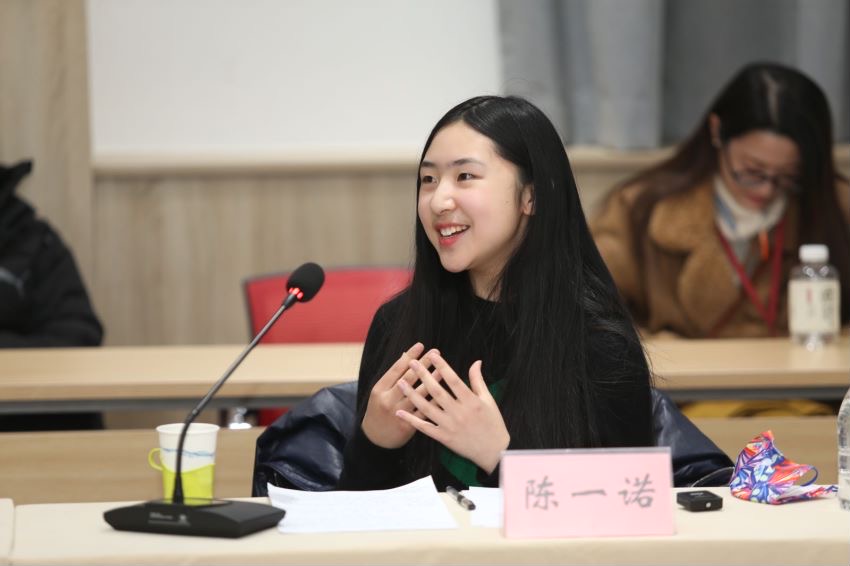


Emily Chen is discussing her experience of watching movies. (Photo provided to GMW.cn)
By Emily Chen
Heroism, anthropomorphic monkey, and post-apocalyptic world – these concepts invoke a specific set of images in a Chinese viewer’s mind. They promise action-oriented scenes, or another Monkey King with his gold-banded staff, paying tribute to the Chinese classic. Yet if there was ever an intention to create such a film, the director elucidated, it had died during the 10 years that it took to refine Chosen. Premiering this January, Chosen depicts in 3D animation the heroic development of a monkey (Kong), dragon (PaoPao), and human girl (Nuwa) on an AI-dominated planet. The narrative opens with Nuwa’s grandfather recounting their first resistance against the robot-men and the legend of a little dragon. PaoPao seeks a “chosen” heir for the hero’s golden hoop, and inadvertently finds it in a thieving monkey. Ultimately, the lives of the three intersect as they strive to liberate humanity from a race of machines. The film drastically defied my expectations. Chosen is a postmodernist collage of elements: from Eastern and Western allusions to oriental and cyberpunk aesthetics, and to myth and modern AI. It is a cauldron in which, every other minute, a new intertextual reference is cast: the eyeglasses, finger gesture, and simulated training platform of The Matrix; the “chosen” monkey’s expedition and Buddhist master of the Academy from journey to the West. Yet this fusion occurs only after varying levels of deconstruction. Chosen fragments the audience’s ossified image of heroism and classics such as Journey to the West, disintegrating barriers to construct a unified world for its characters.

Emily Chen communicated with the director on site. (Photo provided to GMW.cn)
Chosen deconstructs Journey to the West by inverting its symbols. An idiom describes how Sun Wukong “can never leap out of the Buddha’s palm”, for a golden hoop and Buddhist incantation will nullify the monkey’s powers. In Chosen, however, this hoop can only be unfastened by the wearer himself, creating a self-imposed constraint. Consigned to the dragon’s care by his master and labeled as a “burden” by the Academy’s headmaster, the hoop symbolizes the encumbrance of others’ expectations. It also represents Kong’s own need for external validation; for the assurance that comes with being “chosen” by a divine force. Hence, it propels the Bildungsroman narrative by marking his two inner changes (contrasting against the Monkey King’s 72 physical transformations in Journey to the West). The first is when its acquisition awakens him to a sense of responsibility, and the second is when the monkey, experiencing anagnorisis after the death of a friend, chooses to discard it. The ideal which the hoop embodies, like parental expectations, is something that helps initiate the character’s journey, but belongs to childhood and must be outgrown, flung away. This allegory internalizes the pilgrimage that the monkey undertakes in Journey to the West.
Yet the protagonists’ actions resist being construed as a symbol. Chosen humanizes its characters and exposes traditional heroism as a chimeric dream. “Sun Wukong may be Kong’s idol, as he is the idol of every monkey,” theorized Chosen’s director, “but he cannot be him.” Unlike the Monkey King, Kong was not born from the splitting of a rock or otherwise distinguished from the typical monkey. Even his name, “Kong”, signifying negligibility, is a parody of the Buddhist philosophy behind “Sun Wukong”. Rather than the prerogative of a “chosen” one, the monkey’s evolution after seizing the hoop and his opportunity (by choice) is the shifting of a side character to centre-stage. Notably, Kong only begins to be characterized after gaining possession of the hoop: prankish and infuriating as he initially is, the monkey extends his hand to the dragon in peril, with whom he was quarreling only moments before. Hence, Kong’s mundane compassion compensates for the absence of superhuman heroism. Characters are no less disillusioned about each other, which is vividly exemplified by the dragon PaoPao. At the beginning, Nuwa hears from her grandfather of the fabled dragon; mighty, infallible, a sublime myth – then the shot cuts to a droll little creature toddling along a cobbled street; eccentric, unreliable even, but certainly not heroic. PaoPao’s character at once experiences a bathetic fall, adding a touch of comic relief to the grave circumstances in Nuwa’s village after the robot-men’s arrival. The whimsicality of the film (ending abruptly and steered by coincidental encounters such as Nuwa, PaoPao, and Kong’s unlikely meeting in the desert) is like that of its characters, but both are impelled by realistic human motives. When Kong relinquishes his hoop and the nametag of a “hero”, it is not for symbolic reasons, but from grief at a friend’s sacrifice and the guilt of occasioning it.

Movie poster provided to GMW.cn
This self-recognition echoes the emphasis placed on inner drive, mirrored by the film’s postmodernist focus on content over form. Chosen’s protagonists undergo an internal odyssey whose path is dictated only by themselves. Whether through Kong tossing away his hoop, or the crumbling away of the dragon’s ashen skin, characters strip away the extrinsic appearance and accessories on which they depend to unearth their true selves. This is like being extricated from the Matrix simulation, abandoning a virtual world for a real one, however unpalatable the knowledge of that reality is.
Chosen subverts tradition, but also redefines the relevance of the past. Nuwa follows not her grandfather’s teachings, but her inner compass, defying the Chinese principle of filial piety. Yet though her grandfather argues that the “past must be buried”, he disproves his own word. As he and Nuwa flee from the machines, Grandpa has a flashback of his venturesome younger self as a sailor, an experience extracted from the past that informs his driving. After all, do steering a ship and driving an engine not share the same principle? This belongs to a greater pattern of revival that modernizes past knowledge, just as Chinese classics and legends of old are made relevant to a contemporary audience. Hence, Nuwa’s generation and her grandfather’s are portrayed as educating each other and collectively moving forward. In a similar sense, Kong realizes the ridiculousness and impracticality of traditional combat techniques learnt at the Academy when he deploys them against a robot: the need to adapt and grow from experience is paramount, even after these two frames of time are unified.

Movie poster provided to GMW.cn
From the metallic city of the robot-men to amber-tiled rooftops sheathed by gossamer clouds and a labyrinth of quaint Chinese courtyards, the plot is propelled by transition of scene, as in a road film. Viewers are like Alices in Wonderland, ushered down an infinity of rabbit holes. Chosen also distorts the spatial sense, creating a multiverse in which characters can freely roam. The Academy of Magic – one could picture it nestled in mystical woods or sky-high with gilded, majestic halls – is not situated in a specified time or locale but spanning across all ages of genius and invention. Just as it is possible for William Blake to “see a World in a Grain of Sand / And a Heaven in a Wild Flower”, here every rock holds an earthly destination; in each little character lies a seed of goodness and potential, which, if it cannot quite blossom into world-saving heroism, can at least stimulate change within themselves.
Chosen begs much of its audience–for us to open our minds and embrace a union of East and West, past and future; to break free from ourselves, and overthrow past ideals. Simultaneously, it is only a compelling animation, and asks nothing but for viewers to roam its multiverse, waiting to elicit a laugh from families.

Yinuo (Emily) Chen is a 16-year-old Chinese student at Branksome Hall, Canada. She is a member of the China Film Critics Association and has published a number of reviews. As an actress, she won international awards for her performance in the movie "When a Peking Family Meets an Au-Pair". She has also written, directed, and starred in public welfare short films. In her spare time, Emily enjoys writing, musical theatre, graphic design, and studying various languages.
点击右上角![]() 微信好友
微信好友
 朋友圈
朋友圈

请使用浏览器分享功能进行分享
